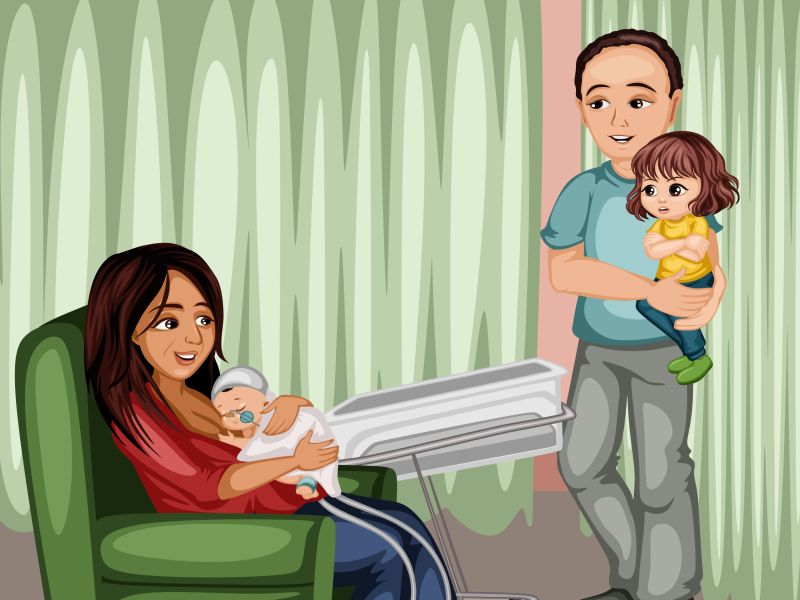NICU stands for Neonatal Intensive Care Unit. It is a specialised unit in a hospital that provides comprehensive care to babies born prematurely, those with medical complications at birth, or those born at low birth weight. NICUs are being set up in most government and private hospitals in India. The NICU cost per day in India can vary greatly depending on the type and level of care needed.
Apart from medical care, NICUs in India also provide psychological and social support to the families of newborns. They help provide counselling to the families and offer guidance on how to take care of the newborn at home. The goal of NICUs in India is to provide the best possible care to newborns to reduce mortality and morbidity. They also help reduce the incidence of long-term complications, such as cerebral palsy, and help improve the newborns’ overall health.
Find Hospital and Fund Your Treatment with transparent costs and expert care.

Table of Contents
NICUs Cost Per Day In India

NICU charges per day in India can range from Rs 5000 to Rs 10,000 in general. NICU cost per day in India is influenced by factors such as the type of hospital (public or private), the location of the hospital, the availability of specialized equipment and staff, and the specific care requirements of the newborn. In government hospitals, the cost is usually much lower than in private hospitals, but the availability and quality of care can be limited.
In addition to these costs, parents may be required to pay for lodging, meals, and transportation costs for hospital visits. These costs can add up quickly, making it difficult for some families to afford the necessary care for their babies. Finally, the cost of NICUs in India also depends on the patient’s insurance coverage. Many private insurance companies provide a range of NICU services, while government-run facilities may offer free or subsidised treatment.
At the lower end of the range, the NICU cost per day in India may include the price of a nurse, doctor, and other medical staff, and essential equipment. At the higher end of the range, the cost consists of more advanced equipment and a higher level of care.
In addition to the cost of medical staff and equipment, the NICU cost per day in India may include the cost of medication. Medication costs can vary widely depending on the type of medication needed. Finally, the cost per day for a NICU in India may also include the cost of additional services such as transportation, accommodation, and meals for caregivers. These costs can add up quickly, especially if the NICU is remote. Overall, the cost per day for a NICU in India can vary significantly, depending on the type of facility and the level of care provided.
To summarise, the cost of NICUs in India can vary widely depending on the type of facility, location, and services provided. Private facilities are more expensive than government-run facilities, and insurance coverage can also affect costs. In addition, parents may need to budget for lodging, meals, and transportation costs.
Explore Patient Care Guides to make informed healthcare decisions.
Factors Affecting The Cost Of NICUs In India

The cost of Neonatal Intensive Care Units (NICUs) in India can vary significantly depending on a number of factors. These factors include the location of the NICU, the type of care provided, the resources available, the size and complexity of the NICU, and the type of equipment used.
1. Location: The cost of NICUs in India can vary depending on their location. For example, a NICU in a major city will typically be more expensive than one in a rural area. This is because the cost of running a NICU in a large city is usually much higher than in a rural area due to higher overhead costs and higher salaries for staff.
2. Type of Care: The care provided in a NICU can also affect its cost. For example, a NICU that provides Level III care (the most intensive level) or specialised care such as neonatal surgery or intensive care will typically be more expensive than one with only Level II care.
3. Resources Available: The resources available in a NICU can also affect its cost. NICUs that are equipped with the latest technology and have access to the best doctors and nurses will typically be more expensive than those with fewer resources.
4. Size and Complexity: The size and complexity of a NICU can also affect its cost. NICUs that are larger and more complex will require more resources and staff and thus will be more expensive than smaller, simpler units.
5. Equipment Used: The equipment used in a NICU can also affect its cost. NICUs with the latest technology will typically be more expensive than older, less sophisticated equipment.
Ultimately, the cost of NICUs in India will vary depending on the factors mentioned above. It is essential to carefully consider these factors when deciding on the right NICU for your needs.
Top 10 Neonatal Hospitals In India

India is home to some of the best neonatal hospitals in the world. These hospitals are equipped with the latest technology and provide extensive care for premature babies and newborns. The neonatal care units are staffed with highly skilled and experienced neonatologists, pediatricians, and nurses. Here is a list of the 10 best neonatal hospitals in India:
- KEM Hospital, Mumbai
- Apollo Hospitals, Chennai
- Surya Child Care Centre, New Delhi
- Narayana Health, Bengaluru
- K.J. Somaiya Medical College, Mumbai
- Fortis La Femme, New Delhi
- Medanta – The Medicity, Gurugram
- Max Super Speciality Hospital, New Delhi
- Manipal Hospitals, Bengaluru
- Amrita Institute of Medical Sciences, Kochi
More About NICU

Neonatal Intensive Care Unit (NICU) is a specialised care unit in a hospital that provides care to premature and newborn infants with low birth weight or other health issues. The NICU is staffed by a team of specially trained healthcare professionals experienced in caring for newborns with medical complications. The team may include neonatologists, nurses, respiratory therapists, physical therapists, occupational therapists, dieticians, and social workers.
The NICU provides a safe and supportive environment for babies and their families. Newborns receive specialised care from highly trained professionals experienced in providing the best care for newborns. This includes monitoring vital signs, nutritional support, and medical care. The medical team will also provide emotional and psychological support for the newborn and their family.
The NICU is equipped with the latest technology and resources to help provide the best care for the newborn. This includes unique monitoring systems, ventilators, incubators, and surgical equipment. In addition, the NICU also offers educational resources to help families understand their newborn’s condition and care needs.
NICU care is vital to ensuring newborns’ health and safety. It is crucial for families to understand the importance of this care and to take advantage of the resources available to them. With the proper care, the newborn can fully recover and thrive.
Levels Of NICU

Neonatal Intensive Care Unit (NICU) is specialized care for premature, critically ill, or medically complex newborns. The level of care in a NICU is divided into three groups, each providing increasingly specialized care.
1. Level I – This is the NICU’s most basic level of care. Level I Neonatal Intensive Care Units (NICUs) provide primary or “general” care for newborns who are generally healthy but may need additional monitoring or care for a short period. These babies typically have minor health issues such as low birth weight, jaundice, or difficulty feeding.
2. Level II – Babies in the level II NICU may require more interventions than those in Level I. These babies may have more severe issues such as respiratory problems, heart defects, or infections. Babies at this level may need to be monitored more closely and may need help with breathing or IV fluids. These units are typically located in community hospitals and staffed by a team of neonatal nurses, neonatologists, and other specialists.
3. Level III – Babies in the Level III NICU are typically the most critically ill. Level III Neonatal Intensive Care Units (NICUs) provide newborns with the highest level of care. These babies may require specialized care such as ventilators, nutritional support, and medication. They may also need surgery or other medical interventions to treat their conditions.
4. Level IV – Level IV NICUs are the most advanced and provide the highest level of care. Babies in this level of care often have multiple medical issues that require specialized, complex care. These babies may require complex surgeries, long-term treatment, and specialized care from a multidisciplinary team. The newborns in a Level IV NICU may have the most complex and life-threatening illnesses or conditions and may require the most specialized care and monitoring.
Importance Of NICU In India

NICU (Neonatal Intensive Care Unit) is essential in many hospitals across India. It provides specialised care for babies requiring medical attention immediately after birth. The NICU is important in India due to the high infant mortality rate in the country. According to the World Bank, India has the highest rate of infant mortality in the world, with an estimated 2.3 million deaths of children under the age of five occurring in 2019. NICU, or Neonatal Intensive Care Unit, is a specialised hospital for newborns born prematurely or critically ill. NICUs are becoming increasingly important in India due to the high rate of premature births, low birth weight babies, and neonatal mortality. Every year, India’s neonatal mortality rate is one of the highest in the world, and nearly half of all infant deaths are due to neonatal conditions.
NICUs provide a safe, supportive, and intensive environment for premature or critically ill newborn babies. These units are fully equipped with the latest technology, specialised medical and nursing staff, and advanced medical equipment to provide the best care to these fragile babies. This includes ventilators, incubators, cardiac monitors, phototherapy machines, and other life-saving equipment.
The NICU provides life-saving care for newborn babies who are born prematurely, have congenital disabilities, have low birth weight, or have other medical complications. The unit is staffed by highly trained medical professionals who provide specialised care for these infants. They have specialised equipment and medications to provide the best care possible. The staff also provides education and support to the families of these babies.
The NICU also supports mothers and their families who are in the process of giving birth. The staff is trained to understand the needs of the mothers and provide emotional and practical support. This can be especially important for mothers who are experiencing high-risk pregnancies or who are in a vulnerable situation. The NICU is essential in India because it helps reduce infant mortality rates and provides the best possible care for babies. It is also beneficial for providing support to mothers and families during pregnancy and delivery. NICUs also offer specialised care such as respiratory support, nutrition, and other medical and nursing care. This specialised care helps ensure that newborns are healthy and can survive.
The importance of NICUs in India cannot be overstated. They are essential for providing the best possible care to newborns and helping to reduce the high rate of neonatal mortality in the country. By providing specialised care and support to premature and critically ill babies, NICUs can help to ensure that these babies have the best chance of survival. They also help families with emotional and psychological support during this difficult time.
Conditions Where NICU Is Required

NICU, or Neonatal Intensive Care Unit, is a specialised unit of a hospital providing intensive care for newborns with serious health problems. These babies may have heart or lung problems, infections, or other medical issues. The NICU staff monitors and treats these babies, so their conditions don’t worsen. They also provide therapies and medications to support the baby’s development. The NICU is a place of hope and healing, and the staff offers the best care possible for babies who need special care.
1. Premature Birth
When babies are born too early (before 37 weeks of gestation), they are at a much higher risk of severe health issues and may require specialised care. The NICU is equipped to provide round-the-clock care for these babies, including monitoring vital signs, providing oxygen, and administering medications as needed.
2. Congenital Abnormalities
Babies born with congenital disabilities, such as heart defects, genetic disorders, and brain abnormalities, may require the specialised care of a NICU. The team in the NICU can provide specialised monitoring, treatments, and therapies to help these babies thrive.
3. Respiratory Distress
Babies who experience difficulty breathing after birth may require the assistance of a NICU team. The team can provide oxygen therapy, respiratory support, and other treatments as needed.
4. Infections
Some newborns may be exposed to womb infections or develop infections shortly after birth. The NICU team is equipped to provide the treatments necessary to help these babies fight off their infections and recover.
5. Low Birth Weight
Babies with low birth weight (less than 5 lbs) may require specialised care in the NICU. The team can provide the appropriate nutrition and support to help these babies thrive.
Refer a Patient for Medical Help to trusted hospitals and specialists.
Disease Cost Calculator : Quick, simple, and accurate medical cost estimates.
Conclusion
NICUs in India play a critical role in saving the lives of vulnerable and critically ill newborns, often serving as the only hope for affected families. These specialized units provide advanced neonatal care that helps improve survival rates and reduce infant mortality while also offering emotional support to families during an extremely stressful time. To meet the growing demand, greater investment in NICU infrastructure, medical equipment, and trained healthcare staff is essential, along with improvements in quality of care, accessibility to specialized treatment, and effective communication between medical teams and parents.
NICU treatment can be financially overwhelming for families, especially when prolonged care is required. In such situations, ImpactGuru, one of India’s leading fundraising platforms, enables families to raise money online for NICU expenses. Through ImpactGuru fundraising, families can access timely financial support, ensuring newborns receive the critical care they need without delays caused by financial constraints.












